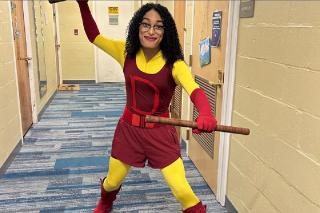In celebration of Transgender Awareness Week (November 13–19) we spoke to incoming first year student Mattea Ortiz ’28, who reflects on the benefits of a women-centered institution for trans, queer, and nonbinary students.
“Since I was young, I’ve always loved stories,” says Mattea Ortiz Ortiz ’28. “I played with toys and crafted my own fictional worlds.”
During her junior year of high school, a class in digital media and journalism introduced Ortiz to a new kind of storytelling. “We had to write a news article,” she says. “I wrote mine on my top comics of 2022 and thought, this is fun!”
Since then, her interest in journalism has developed beyond writing opinion pieces to considering the stories of those around her. This past summer, she was accepted into the Youth Arts Journalism Initiative Class of 2024, a project sponsored by the Arts Council of Greater New Haven, Connecticut. “My love of stories is living on through empowering other people’s voices,” says Ortiz. “I want to capture whatever magic I can find in other people.”
As part of the internship, Ortiz wrote articles about comic stores in New Haven and Milford, Connecticut, as well as Terrificon, the annual comic convention. In the most recent article, she equates superhero alter egos with revealing her own gender transition; but that isn’t her only connection to these stories.
“There are so many superheroes who are journalists,” she says. “Daredevil (Marvel Comics) is my favorite, and a big character in his books is [investigative journalist] Ben Urich. He’s not just a sidekick who happens to cover what Daredevil does, he’s lively and realistic, constantly battered and broken down, but he tries so hard to tell the truth and triumph over evil. It’s very inspiring.”
Her Journey to Simmons
Ortiz’s interest in journalism and communications is only part of what brought her to Simmons. Ortiz was familiar with Boston, having visited an older sister who lives in the area. “I really liked the vibe here,” says Ortiz. “It’s very gay, and very walkable.”
After receiving her financial aid package, Ortiz decided to visit the campus two weeks before the decision deadline. “It seemed like a safe space,” she says. As a trans girl, that safety is particularly vital. “It seemed like a supportive environment. Plus, there is a real campus here, which makes it easier to meet people and hang out. And being women-centered is very cool.” Ortiz noted that, unlike other universities in the area, Simmons offers housing specifically for transgender students.
Now, a month after moving onto the campus, Ortiz has found additional reasons to appreciate Simmons. As part of the Bridge Program, she had the opportunity to move to campus early and connect with other incoming undergraduate first-year students who identify as Black, Indigenous, People of Color (BIPOC). “I met all the cool people of color, and still have friends from that [experience],” says Ortiz. “I got here a few days early, socialized with people, and found my footing.”
Thus far, her favorite course is Media Writing and Editing taught by Nick Osborne, Manager of Communications and External Affairs at Simmons. “[Osborne’s] energy is warm, welcoming, and engaging. He constantly motivates students to not only try their best, but connect the class to topics they already enjoy,” says Ortiz. “The course is full of immersive assignments that relate to both journalism and public relations. They allow me to practice my skills in really compelling ways that I look forward to working on, even if I’m not the best at meeting deadlines.”
Transgender Pride at Simmons
“College is about finding out who you are as a person. It makes sense that [many students] would transition while they are here. I’m happy to be here to find an idea of what it means to be myself and to be confident.”
Ortiz notes that the Trans and Non-binary LLC offers a welcome safe space. She was also pleased to find it easy to change her name in Workday and Moodle.
“I’ve worked so hard to get to where I am now,” she says, reflecting on her transition, “and I get to put that to use now. I was a very weird kid, but I feel that I lost a lot of that in high school. I was quiet, kept to myself, and didn’t talk in class. A lot of my transitioning has been about being comfortable being weird again! I get to be confident in myself as a woman. I walk up to people and talk to them; my friends view me as confident. I’m happy to be here. I can’t afford to silence myself any longer.”

